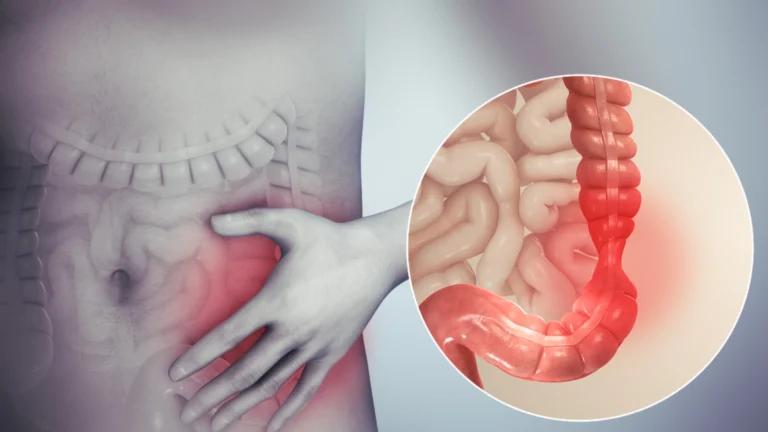
Having too much air or excess gas trapped in the abdomen is a common problem that happens to us all. It causes bloating, stomach pain, burping, flatulence and embarrassment! Here are a few ways to ease trapped wind and some of the causes behind it.
How does wind get trapped?
It is perfectly normal for the body to produce and pass gas as part of the digestive system process. Human beings fart at least 14 times a day. Sometimes during digestion, a bubble of trapped gas can build up inside your digestive tract causing uncomfortable symptoms.
What are the symptoms of trapped wind?
The most common symptoms of trapped wind are:
- Stomach pain
- Bloating
- Burping
- Flatulence (breaking wind)
- Gurgling noises from the stomach
How to ease trapped wind
Try going to the toilet
Passing a stool may help wind trapped in the intestines to escape. Even if you don’t pass a stool, breaking wind can relieve pressure and pain in your intestine.
Chew food thoroughly and slowly
Eating slowly with your mouth closed, and thoroughly chewing your food before swallowing it can help you minimise the risk of accidentally swallowing air. Taking small sips of drinks rather than large gulps can also help you avoid swallowing large quantities of air, which may later cause bloating and stomach pain.
Physical activity
Taking a walk, bike ride or certain yoga poses stimulates the digestive system, encouraging matter to move through the intestine.
Don’t use straws to drink liquids
The initial sip introduces air into the gastrointestinal tract and subsequent sips capture more and more air causing gas and bloating.
Avoid chewing gum
It is not the actual gum causing the gas but the motion of chewing which involves swallowing excess air. Bloating can occur from the overproduction of stomach acid as your body prepares to digest food.
Avoid drinking with meals
Drinking with meals is claimed to hinder digestion and cause bloating. There is no solid evidence behind this but there is no harm in avoiding this.
Reduce the use of artificial sweeteners
Sweeteners such as sorbitol, erythritol and xylitol can have a laxative effect on the body.
Consider giving up smoking
Smoking can have several effects on the digestive system. The toxins can irritate the lining of the stomach and contribute to bloating. The additional swallowing of air during the action of smoking also adds to the build-up of wind and a bloated stomach.
Wear loose clothing
Wearing tight, restricted clothing can cause pressure on the tummy causing abdominal pain, making it harder for gas to pass.
Sitting up straight
Sitting upright while eating will help prevent indigestion, allowing gravity to push food through the digestive system and work more efficiently. When we slouch or hunch over we put pressure on our digestive system.
What are the causes of trapped wind?
During digestion, chemicals called enzymes break down foods so the food can be absorbed in the small intestine, but certain foods we consume aren’t broken down. By the time they reach the large intestine, they’re still undigested. However, the large intestine can break down these sugars and carbohydrates using the millions of bacteria present in the gut. The problem is, that doing so produces gases, including carbon dioxide and hydrogen sulphide, which are released as flatulence., If we can’t release this intestinal gas through burping or passing wind, it remains trapped in the abdomen, causing pain and bloating.
Here are a few causes of trapped wind:
Swallowed air
Swallowing air happens when you eat large amounts of food quickly without thoroughly chewing it and when you gulp down drinks quickly.
There are other ways people swallow air:
- Whilst talking, especially when emotions such as excitement, nervousness or sadness are experienced
- Chewing gum
- Smoking
- Drinking a lot of liquids with meals
- Having dentures that are too loose
Diet
Your diet and the foods you consume contribute to the amount of trapped wind you experience. Many carbohydrate foods cause gas but less so fats and protein. The main food culprits are:
- Carbohydrates that are hard to digest, such as beans, lentils, whole grains, oats and bran
- Vegetables such as broccoli, cauliflower, cabbage, sprouts, green peppers, onions, carrots, celery
- Milk products such as cheese
- Fruits high in fructose such as apples, raisins, pears
- Fizzy drinks
- Artificial sweeteners such as sorbitol, mannitol, or xylitol
Keeping a food diary is useful to note what you’ve eaten and when you experience bloating.
Food intolerances
Some people are lactose intolerant and struggle to digest milk, cheese, ice cream, and other dairy products. An enzyme called lactase is very low in these individuals, causing unpleasant symptoms such as diarrhoea, stomach ache, belching, and discomfort.
Coeliac disease is caused by an intolerance to a protein called gluten which is found in certain foods, causing uncomfortable symptoms.
If you have a food intolerance, you should check the ingredients before eating. You may not be aware you have an intolerance, in which case you should speak to your GP.
Medical conditions
Irritable Bowel Syndrome (IBS) is a gastrointestinal disorder that affects the functioning of the large intestine (colon) Individuals with IBS often have abnormal intestinal contractions, which can lead to changes in bowel habits and the characteristic symptoms of the condition.
Home remedies
- Chew food slowly: This gives the amylase in saliva more time to start breaking down carbohydrates, which can help prevent excess wind
- Eat smaller meals: Less food but more frequent meals can help the digestive system
- Drink plenty of water: This can reduce the risk of constipation and keep things moving. Drinking warm water can help calm your gut and move food through the digestive system
- Drink herbal teas: Consuming peppermint, fennel or chamomile tea can help relieve flatulence symptoms
- Physical activity: Taking a walk, bike ride or certain yoga poses stimulates the digestive system and encourages matter to move through the intestine
Over-the-counter treatments
When home remedies don’t seem to help enough you can visit a pharmacy for over-the-counter treatment:
Peppermint oil
- Contains essential oils which have been shown to reduce flatulence and bloating
Simeticone
- It works by breaking up bubbles so they can pass easier
Activated charcoal
- Charcoal traps gas molecules reducing the gas that causes bloating
Probiotic supplements
- Probiotics often contain the bacteria Bifidobacterium and Lactobacillus, which are beneficial in gas reduction and improving digestive health. Adding in fermented foods like yoghurts that are rich in probiotics can be helpful to manage bloating too
Always talk to your healthcare provider to check if these treatments are suitable for you.
Conclusion
It is completely normal to have a build-up of gas now and again. Avoid or limit foods that make you gassy and also make some lifestyle changes if you want to reduce the chances of suffering with flatulence. Holding in gas isn’t something you should do, as it can cause heartburn and pain, sometimes it’s better just to release it!
Sources
- Gas (Flatulence) – Harvard Health
- Chronic Burping and Belching – Current Treatment Options in Gastroenterology – Springer
- Controlling Intestinal Gas – IFFGD
- Wind | Expert Guide – Guts UK
Medical Disclaimer
NowPatient has taken all reasonable steps to ensure that all material is factually accurate, complete, and current. However, the knowledge and experience of a qualified healthcare professional should always be sought after instead of using the information on this page. Before taking any drug, you should always speak to your doctor or another qualified healthcare provider.
The information provided here about medications is subject to change and is not meant to include all uses, precautions, warnings, directions, drug interactions, allergic reactions, or negative effects. The absence of warnings or other information for a particular medication does not imply that the medication or medication combination is appropriate for all patients or for all possible purposes.









